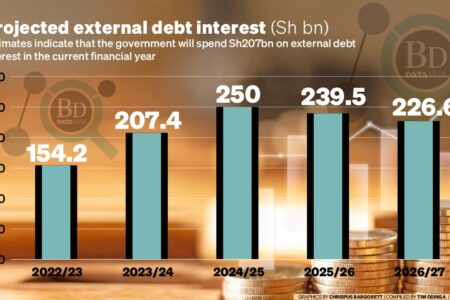Economy
Mega project financiers face tax break suspension
Friday September 22 2023
GRAPHIC | CHRISPUS BARGORETT | NMG
The Treasury has hinted at a suspension of tax waivers on the interest income earned by global financiers of mega infrastructure projects in what is likely to inflame tensions with various lenders, including Kenya’s leading bilateral lender, China.
As part of a fallback plan should the revenue-raising measures contained in the Finance Act 2023 not yield their desired results, President William Ruto’s government has promised the International Monetary Fund (IMF) to get rid of exemptions on interest income as part of “corrective tax measures” which include reducing tax expenditures.
Read: 19 mega projects hit as Sh66.8bn China, foreign loans cut
“(The government will be) submitting to Parliament by end-October 2023, along with a Supplementary financial year 2023/24 Budget, a package of legislative changes to strengthen tax collection including but not limited to…the reduction of tax exemption on interest income,” said the Treasury.
Interest income is the revenue earned by lending money to other entities. Lenders basically charge borrowers interest for using their capital in the form of debt.
This would impact the repayment of foreign loans used to finance several foreign-funded mega infrastructural projects including the Standard Gauge Railway (SGR), roads, ports, airstrips, and power sub-stations that were built using foreign loans by retired President Uhuru Kenyatta.
Treasury Cabinet Secretary Njuguna Ndung’u said that the move will have a positive impact on income.
“Reducing tax expenditure remains the single goal of enhancing the tax base,” said Prof Ndung’u in a text message.
Energy, water sectors
In 2015, the former Cabinet Secretary for Treasury Henry Rotich exempted tax interests paid on loans from foreign sources for investing in the energy or water sectors, roads, railways, or aerodromes.
Mr Rotich also exempted from taxes all payments made to non-residents for loans given for energy projects made under the Power Purchase Agreements (PPAs).
Michael Mburugu, the Regional Tax Partner at PKF, an audit firm, noted that the removal of the exemptions means that the withholding tax will be borne by the financiers.
“The impact is that then you will become a little unattractive,” said Mburugu, noting that introducing the tax when a project is ongoing might interfere with the firm’s cash flow or the financial project of that project.
The move might be counterproductive by increasing the financing costs for state agencies as some of the contracts explicitly state that payment of any taxes is to be borne by the end consumer.
Financing agreements
In all three financing agreements for the construction of the SGR from Mombasa via Nairobi to Naivasha, for example, the contract explicitly states that the loan does not attract taxes and should new taxes be introduced they will the Treasury will have to absorb the cost, a move that is likely to hurt taxpayers.
For the three loans—two for the Mombasa-Nairobi leg and one for the Nairobi-Naivasha—Kenya is expected to pay a total of $1.62 billion (Sh236.8 billion) in interest by the end of 2036 to the China Exim Bank.
Exim Bank
“For the avoidance of doubt, goods, and services of the Borrower under this Agreement for the Project will be free of taxes and where under any tax law or other duty is required by law in Kenya to be imposed by any agency such taxes or duty will be borne by the End-user,” reads part of the Buyer Credit Agreement between the Exim Bank of China and the Treasury for the $1.6 billion (Sh233.9 billion) loan for the construction of the SGR.
The exemption of tax on interest income saw foreign lenders bankroll several independent power projects (IPPs), including the Lake Turkana Wind Power, the largest wind power farm project, which received $680 million (Sh100.13) billion from various global financiers including African Development Bank, European Investment Bank, Standard Bank of South Africa Limited and Nedbank Limited.
George Aluru, the chief executive officer of the Association of Independent Electricity Producers, noted that these changes might hurt consumers in the form of increased tariffs as most PPAs have clauses to deal with such changes.
Mr Aluru noted that changing a tax law mid-stream means increased risk which translates into increased cost.
“But generally all such changes that take away income from a project, just imply you need a higher tariff to get the same return. So it is just counterproductive,” said Aluru.
“There is a change-in-law and change-in-tax clause in the PPA, and it has some sought of cure mechanism or a way you can call on the government,” added Mr Aluru.
Read: What tax relief suspension means for companies
National carrier
Between 1995 and 2017, the Kenyan Government had guaranteed projects valued at Sh145.4 billion projects that had been financed by loans from various countries including Japan, Germany, and the USA, a report by the Treasury shows.
Except for a Sh77.8 billion loan given by the US government to national carrier Kenya Airways, interest payment for all the other loans will start incurring a withholding tax of 15 percent should the Government get rid of the waiver.
→ (email protected)
